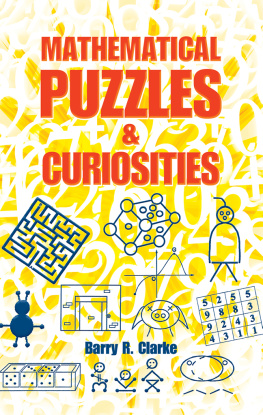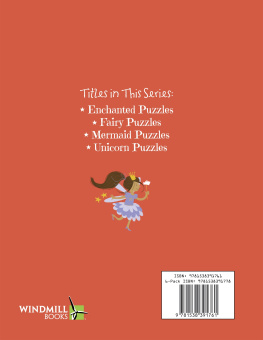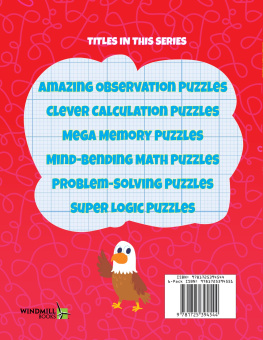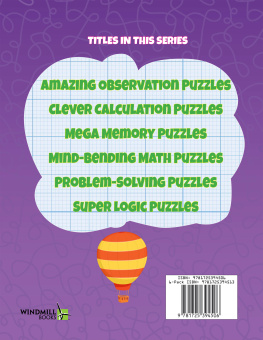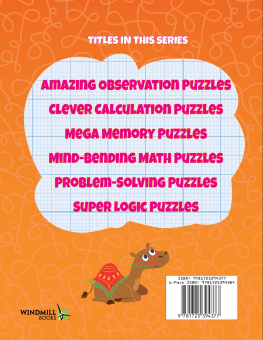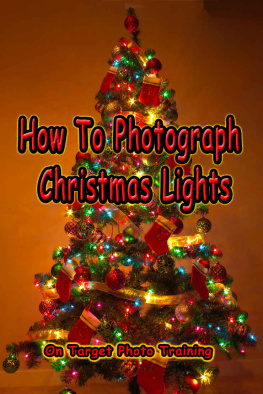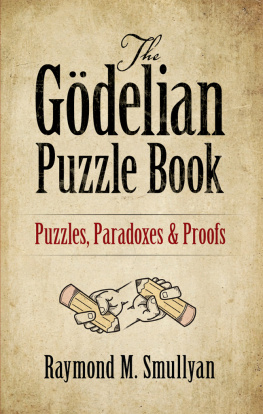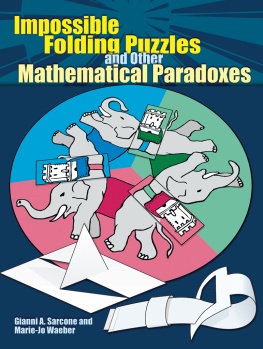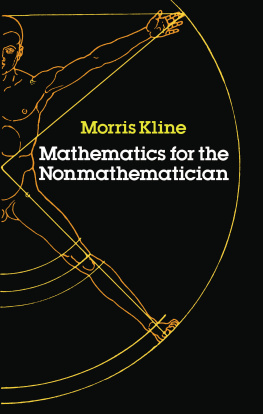A thoroughly enjoyable and mind-expanding array of puzzles and curiosities
Dr Cliff Pickover, author of Archimedes to Hawking
Clever, original brain-teasers are rare. This book has some beauties. Very satisfying.
Will Shortz, Crossword Editor, The New York Times
I highly recommend this delightful book. It contains not only excellent puzzles, but also extremely interesting commentaries and anecdotes.
Professor Raymond Smullyan, author of To Mock a Mockingbird
A wide-ranging and attractive collection that will appeal to all puzzle fans
Professor Ian Stewart, author of Professor Stewarts Cabinet of Mathematical Curiosities
A masterpiece ... reminds me somewhat of my first introduction to Martin Gardner ... this is a must for all puzzle lovers worldwide
Terry Stickels, author of Frame Games
MATHEMATICAL
PUZZLES
&
CURIOSITIES
Barry R. Clarke
DOVER PUBLICATIONS. INC
Mineola, New York
Acknowledgments
I should like to thank Denis Borris and Mark Rickert for testing some of the mathematics and logic puzzles in this work on the puzzles forum of my website http://barryispuzzled.com. Also, thanks to my many mathematics students for trying out some of the creative thinking puzzles and providing valuable feedback. I am grateful to Val Gilbert, and Alex and Kate Ware, for providing the opportunity to construct some of these puzzles for The Daily Telegraph. Finally, I am grateful to Rochelle Kronzek and James Miller from Dover Publications for their commitment to this work .
Copyright
Copyright 2013 by Barry R. Clarke
All rights reserved.
Bibliographical Note
Mathematical Puzzles and Curiosities is a new work, first published by Dover Publications, Inc., in 2013.
International Standard Book Number
eISBN-13: 978-0-486-31572-0
Manufactured in the United States by Courier Corporation
49091201 2013
www.doverpublications.com
Contents
Introduction
First, heres a little enigma which at first sight seems trivial, but if you keep strictly to the given condition for solving it, then its not so easy. Below are seven letters that form an anagram and a seven-letter anagram is reasonably straightforward but the puzzle is, how can you reach the solution without rearranging the letters? The answer, given at the end of the Introduction, demands a leap of the imagination but remember, if you succumb to the temptation to move the letters around then youve cheated!

So, welcome, and I hope that you enjoy this original collection of puzzles and articles. It is a carefully considered compilation in which you can find conundrums in logic, mathematics, and creativity, together with some thought-provoking articles in recreational mathematics and philosophy. It is ideal for those who enjoy alternative ways of thinking and who like to consider a fresh approach to problems. Most of the book requires no specialised mathematical knowledge but those articles near the end that are more demanding can be penetrated by a reasonable amount of high-school algebra.
Some of the articles deal with classic teasers such as The Unexpected Hanging, The Monty Hall Problem, and The Sleeping Beauty Problem, but I have resisted resurrecting a standard analysis of these items, preferring instead to present my own way of understanding them. Other topics such as the Shakespeare Puzzles and Titans Triangle are entirely new, the first being a creative interpretation of the dedications that preface the Shakespeare Sonnets (1609) and First Folio (1623), and the latter being a fascinating extension of a classic IQ puzzle. There are also more philosophical topics such as Zeno and Infinitesimals, and the Wave-Particle Puzzle, which I hope will encourage the reader to think again about these problems.
The puzzles in this work are entirely original and most of them have been published in my column in The Daily Telegraph. They have been arranged to increase in difficulty as the pages turn and the solutions have been deliberately placed out of order at the end to avoid inadvertently seeing the next solution. The answer to a puzzle can be located by referring to the solution number given at the end of the puzzle (not the page number) then looking it up at the back of the book. The creative thinking puzzles encourage alternative ways of thinking and two hints for each are provided near the end of the book to lessen the demand for mind reading. They are ideal for group problem-solving sessions and many of them have already been tested on students who have found them engaging, stimulating, and often amusing. If the solution remains beyond your grasp, even after pondering the hints, please dont feel frustrated. My wish for you is that on examining the answer you can enjoy it as puzzle art and, perhaps after having mastered a few of the basic principles, might even be inspired to create some of your own.
The following is an example of the kind of visual creative thinking puzzle that might be encountered within these covers. The solution is given at the end of the Introduction. Can you spot the difference between these two quarters?

Having taught mathematics at various independent sixth-form colleges in Oxford for many years, one of my interests is in the role that puzzles, especially creative thinking ones, can play in developing the young mind. Sadly, the sole aim of our education system as it currently stands is entirely materialistic, this being to prepare students to obtain employment and earn a living. This usually requires qualifications such as a school certificate or university degree and our current school education system is one part of the long conveyor belt that serves this end. Of course, there are bills to pay so earning a living is far from being undesirable, but my point is that if this is the only goal then there is a price to pay.
When the teacher of mathematics presents his material, he does so with the intention of enabling his students to pass examinations. Mathematics examinations consist of questions and each question demands one or more methods to successfully negotiate it. If the student can identify the set of techniques required for each particular problem and accurately apply them then he can obtain a good result in the examination. The inquisitive student might express reservations about the usefulness of a particular problem to his future existence, ask for an insight into the history of the development of a certain topic, or even request a deeper understanding of why a method works, but none of this is vital to achieving the eventual goal. To pass mathematics examinations, it is only necessary to understand the how and not the why. A sympathetic teacher might wish to deviate from his rote-learning program and nurture the students own capacity for independent thought, but with little time available to cover the curriculum it only compromises his own ability to deliver examination-successful students. Put another way, the current school system does not stimulate the student to think independently, and since most mathematics teachers enjoy exploring the background to their subject, I believe that given the choice they would prefer their students to do likewise.
Next page
